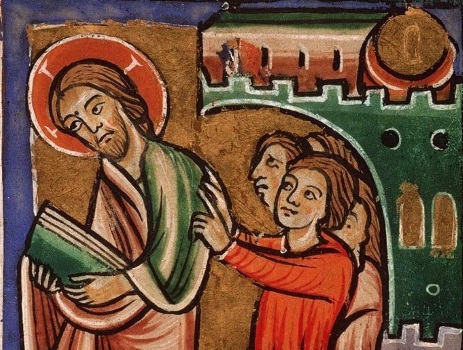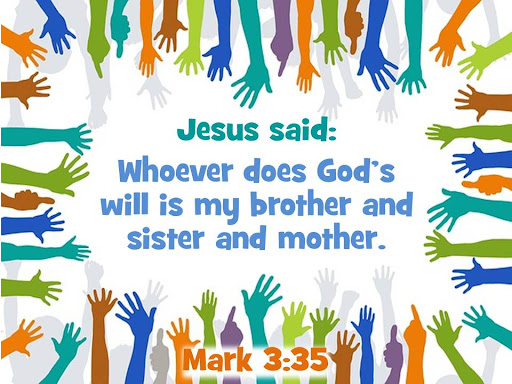What’s in a name?
Rev. Alexander Steward
January 1, 2023
Luke 2:15-21
Grace and peace to you from our Triune God.
Here we find ourselves on the doorstep of a new year. The possibilities lay out in front of us, ours to grasp and run with. There are challenges we have yet to face and even some we are carrying into this new year. This new year can be seen as a clean slate in which a new story can be written. And to begin this story, what a beautiful reminder of the saving grace of God.
What’s in a name?
Each one of you has been named. Named at your birth. In most cultures, naming is one of the first significant things to happen to an individual following birth. Naming has legal implications and establishes a place in the family. As Christians, your name is recited in the sacrament of Holy Baptism as you are baptized in the name of the Father, and of the Son, and of the Holy Spirit.
For many, our names have meaning. There may be a connection to our ancestors which we never personally knew. For example, my first name Alexander, originates with a great-grandfather on my maternal side of the family. While my middle name, Nathaniel, originates with a great great-grandfather on my paternal side. I may have never met either of these men, but to be connected to them through a name reminds me of my ancestors and there are many people who have prepared the way for me. We have created these connections for my children as well. While my son was originally going to be Parker Bradley, we thought it sounded too much like the merger of two board game companies. Thus, we agreed on him carrying my name as his middle name. My daughter was named after one of her great-great grandmothers on my spouse’s side of the family.
Not only are there connections to names, but there are also meanings. Some known, and some unknown. I know my parents didn’t name me Alexander, thinking I was going to be a “great warrior,” even though that is what my name means. I am sure some of you can share similar stories with connections to your families and the power of a name.
Humanity highly values names, and the Abrahamic religions, including Christianity, are no exception. In the book of Genesis, God names things as God creates them — including the first human: “Adam,” who is created out of adamah, the earth. After God creates and names the human, God has Adam name all of the animals. In Exodus, before Moses can introduce the Hebrew people to their God, he has to learn God’s name: “YHWH” — “I am what I am, and I will be what I will be.”
Throughout Genesis, and the rest of the Bible, names are changed to reflect new identities and purposes. Abram becomes Abraham and Sarai becomes Sarah. Jacob becomes Israel, the one who struggles with God. In the New Testament, Saul becomes Paul and Simon becomes Peter, the Rock upon which the Church is built. From creation, names have been given the highest importance. They are more than just words. They often convey a person’s place and purpose in the world.[i]
We witness name changes all the time in our culture through various life transitions. Adoption, marriage, divorce, religious rituals, immigration, or vocation changes. For those in the transgender community, renaming can be an important part of the transition of living into their true self.
In the gospel lesson this morning, we come to the eighth day after the birth of the son of Mary and Joseph. Of course, he is going to be circumcised, this is Jewish custom and it connects the infant to the Abrahamic tradition. But also, as part of the custom, he receives his name. A name which had already been given to Mary by the angel Gabriel when she was told she would give birth:
“And now, you will conceive in your womb and bear a son, and you will name him Jesus.”Luke 1:31
Prior to this, when the shepherds were visiting, there was amazement at the proclamation of the shepherds as they viewed the infant for the first time. And Mary was left to treasure and ponder those very words that were proclaimed. First, she had heard similar words from the angel Gabriel. Now she heard them from shepherds who have traveled a short distance to cast away any doubt and revel in the glory of the newborn King. It is only about a 30-45 minute walk from the Shepherds Field to the Church of the Nativity in Bethlehem where these things were to have taken place.
What do you ponder in this story? We know the story, but perhaps you hear something new in the words today. Yet it was still being fully revealed to Mary as she raised Jesus and would eventually find herself grieving at the foot of the cross. How those words would have resonated for her at that time. The Rev. Suzanne Guthrie shares her reflection on the naming as she ponders this gospel lesson:
I try not to “imagine” Jesus, but when Jesus pops into my imaginal landscape he’s got crooked teeth.
I don’t “make” that happen, but maybe subconsciously I know that if there’s an Incarnation “he” (in our tradition) can’t possibly be perfect. He would sweat and smell and get toenail fungus like the rest of us. Otherwise, what’s the point? Besides, people follow him for what he says and does, not for what he looks like. If you were healed of seven demons, you’d forget the teeth, too.
Temporal things have names. And so, the Son of God, the Son of Man, the King of Kings and Lord of Lords, Prince of Peace, Unnameable Holy, Inscrutable Beauty, Unspeakable and Silent Word incarnated would have a name. Maybe even a baby nickname. Mothers improvise names all day and all night long in an extravaganza of nonsense syllables, cadences, rhymes, sounds (sometimes scatological) all of them meaning “I love you.” Mother’s improvs are Baby’s introduction to human ingenuity and auditory art.
This baby’s name, Jesus, means “salvation is near.” Is this a political statement in a time of oppression? Did the boy Jesus worry about this? Did the young man take his name into the wilderness to wrestle with The Tempter over the nuances of the meaning of “salvation”?
The name of Jesus makes us ponder and reflect upon what it means. For some there is glory and amazement like we witness in the actions of the shepherds. Yet, overtime, there has been indifference for others as the way has become muddied in their journeys and they have slipped back into the ordinary. In the naming of Jesus, we are reminded God is present with us. In the here and now. God is present in our thoughts and actions. God is present in every living creature. Paul tells us in the letter to the Galatians that we are adopted as children of God, and heirs to kingdom.
It is in the naming of Jesus in which we are reminded Jesus has entered the ordinary and made it Holy. In Jesus, we are reminded God saves.
[i] Tew, Anna. Modern Metanoia blog








